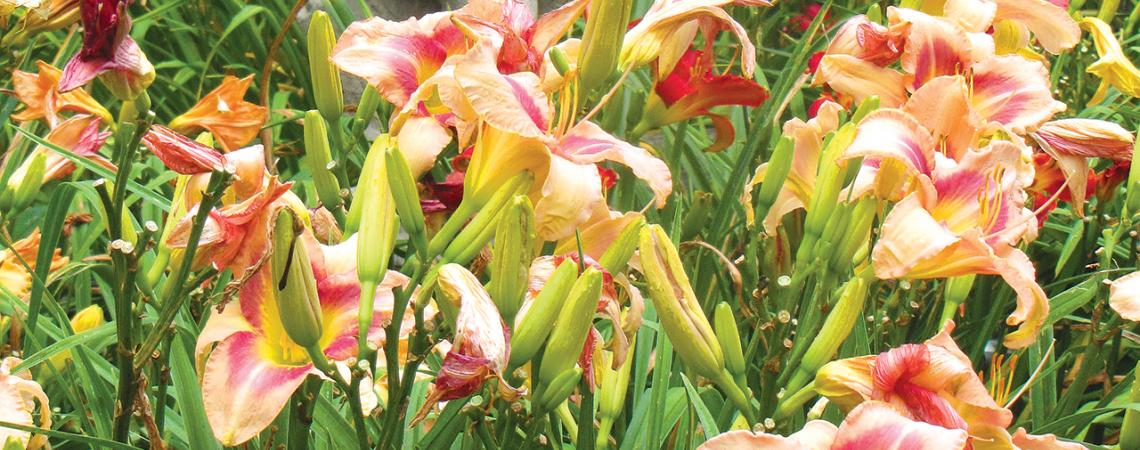George and Ann Brickner operate a plant nursery near Findlay that boasts more than 1,300 varieties of daylilies.
Velvet Eyes and Wild Horses. Strawberry Candy and Pink Bikini. Snow Prince. Moonlit Masquerade. Dreamworld. Baby’s Got Blue Eyes.
Those alluring names are just a few of the thousands — literally thousands — of varieties of daylily. So captivating are these perennial posies, in fact, that Ann Brickner readily admits she is absolutely addicted to them.
“My favorite daylily is whichever one I’m looking at that very moment,” says Brickner, donning a set of daylily-themed earrings. “I do like them all, but I’m really drawn to the showy varieties with double blossoms. There’s one called Birthright that’s a rich coral color and is just gorgeous.”
Ann and her husband, George, along with their daughter, Michelle, own and operate Perennial Plant Peddler, a daylily and hosta plant nursery near Findlay that’s served by Hancock-Wood Electric Cooperative. The two acres of gardens on their property are surrounded by 180 acres of farmland, which George, who is retired from Marathon Oil, still farms with his brother.
The Brickners’ business boasts more than 1,300 daylily varieties and sells about 900 types during the warm-weather months. Most of their named plants are registered with the American Daylily Society, and the business is an official show garden for that organization. Other daylilies that grace the Brickner gardens are hybrids grown experimentally by Ann and Michelle.
“I’m passionate about daylilies because there are so many varieties out there, and with hybridization you are limited only by your imagination and creativity,” says Michelle, who helps run Perennial Plant Peddler on weekends and during the summer, when she’s not teaching at Cleveland School of the Arts. “It’s fun to imagine that maybe we could get a flower to look like this or like that. Could we make one that’s newer? Or taller? Or rufflier? Or more colorful? It taps into my love of the visual arts.”
Ann and George, who met at Heidelberg College and settled in the Findlay area more than 30 years ago, point to Michelle’s fascination with flowers for fueling their garden-love. “As a kid, I’d sit around for hours looking at seed catalogs and say that I wanted to grow all of these different kinds of flowers,” Michelle says. Once her dad retired, he proposed the business idea … and Perennial Plant Peddler was launched.
It wasn’t all smooth sailing at first. They call their first year “the year of the flood.” The usually sedate Sand Run Ditch, which runs through their property and into the Blanchard River, overflowed that year in a major way.
“We had almost 3 feet of water all over our new daylily gardens, with wheat straw from the farm fields floating all over them,” says Ann. “We just rolled up our pant legs and got to work.”
They ended up not losing any of the young plants — partly because of the daylilies’ hardiness. “It had been pretty dry out,” Ann says, “and the plants were thirsty. After all that water, they just started to bloom like crazy.”
They’ve been blooming ever since, providing a riot of color all summer long.
Even though they are aptly named daylily because each blossom on a stem only lasts one day, with careful planning you can enjoy months of multihued flower beds. “Daylilies primarily bloom in July and August,” Ann says, “but if you put in some varieties that bloom at different times, you can have flowers all summer.”
Flag City Daylily Tour
The Brickners’ nursery will be among seven stops on the fourth annual Flag City Daylily Tour in Findlay July 12–14.
The free, self-guided tour in and around town has been heralded as a “Daylily Ambassador of the U.S.” by the American Daylily Society.
“We want to turn people on to these spectacular flowers,” says Mike Anders, a retired professor of music at the University of Findlay, avid gardener, and co-founder of the event. “They are so much more than just the wild, orange daylilies you see in ditches along country roads.”
Anders, in fact, grows about 2,000 varieties of daylilies on his property, which also is served by Hancock-Wood Electric Cooperative and is a stop on the tour.
Daylilies are also very adaptable, he says. “They’ll grow just about everywhere, even here in the Midwest. Even with my heavy, clay soil.”









